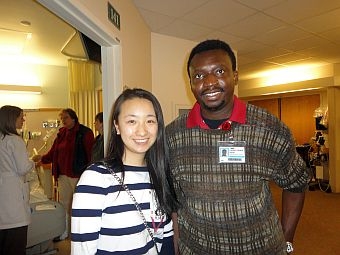 (Host) Modern technology and expert medical care only go so far in restoring the health of many elderly people who face long hospital stays.
(Host) Modern technology and expert medical care only go so far in restoring the health of many elderly people who face long hospital stays.
Research shows that human company can be critically important to geriatric patients.
A student run program at Dartmouth Hitchcock Medical Center is providing that social support.
VPR’s Steve Zind reports.
(Zind) A hospital is a busy place. Doctors and nurses don’t have much time to dawdle and socialize with patients. Yet for older patients, that can be just what the doctor ordered.
(Justin Montgomery) "When older adults come into the hospital, particularly older adults with mild cognitive impairment or any kind of cognitive impairment they’re taken out of their comfort zone. They’re taken out of their normal activities. And this can have a whole series of effects that can make it so that they come in the hospital with one medical problem, but that the longer that they’re here, they have all these other problems."
(Zind) Justin Montgomery is a geriatric nurse coordinator at Dartmouth Hitchcock. Montgomery says older patients need something more than medical attention when they’re in the hospital, or else they lose ground and suffer from what used to be called ‘hospital confusion’.
(Montgomery) "We now commonly refer to it as delirium."
(Zind) Montgomery says the antidote to mental decline in older patients includes some very simple steps.
(Montgomery) "Some of the things that are most important to eliminate as risk factors are very basic. So making sure that people are talking about the current events of the day, or even just reminiscing about the past."
(Zind) Montgomery works with a group of Dartmouth student volunteers who are part of a program called Dartmouth Ears. Each of the students spends a couple of hours a week visiting patients and just talking to them.
Medical student Song Li had a hand in starting Dartmouth Ears about a year and a half ago.
Li says he’d been doing rounds and he was struck by one patient – an older man – who had no visitors. Instead the man watched television all day. When Li spent some time talking with the man he discovered he was lonely.
(Li) "I thought it would be nice if we could get some people to talk to the patients like him and not only ask them about their medical problems but also but also just to socially talk to them about their family, their lives, their stories."
(Chris Audu) "My name is Chris Audu and this is my partner, Snowy. Is it ok if we just chat with you and sit down with you?"
(Snowy Liu) "How long have you been here?"
(patient) "I think I’ve been here three days."
(Zind) Students Chris Audu and Snowy Liu are both studying to be doctors and both are Dartmouth Ears volunteers. Liu sees it as part of her medical education.
(Liu) "As a pre-med or biology major you crave for opportunities to have some sort of patient engagement. For example, getting to know who they are, getting to know their emotions, getting to know what they’re going through."
(Zind) Liu and Audu understand the benefits for the patients, but as future physicians, they get something out of the program, too. Audu says on top of that, he simply likes talking to the patients.
(Audu) "I really enjoy speaking and getting to know people who are generations older than myself. And one thing that I have appreciated from it is talking with patients and literally seeing them come alive as they talk to me about their families, their children, their grandchildren, places they’ve traveled to."
(Audu) "Here he is. Hello, Robert. How are you?"
(Zind) Not all Dartmouth Ears visits go smoothly. Some patients can be unresponsive or out of sorts and not feeling up to a visit from students.
Audu takes it in stride and quotes a Nigerian proverb.
(Audu) "The young people may have more new clothes, but the older people have more rags."
(Zind) The rags signify a lifetime of experience that may have something to contribute to the education of these future doctors.
For VPR news, I’m Steve Zind.